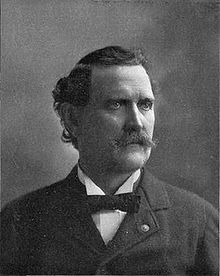John Riley Tanner
| John Riley Tanner | |
|---|---|
 |
|
| 21st Governor of Illinois | |
|
In office January 11, 1897 – January 14, 1901 |
|
| Lieutenant | William A. Northcott |
| Preceded by | John Peter Altgeld |
| Succeeded by | Richard Yates |
| Treasurer of Illinois | |
|
In office 1887–1889 |
|
| Preceded by | Jacob Gross |
| Succeeded by | Charles Becker |
| Member of the Illinois Senate | |
|
In office 1880-1883 |
|
| Personal details | |
| Born | April 4, 1844 near Boonville, Indiana |
| Died | May 23, 1901 (aged 57) Springfield, Illinois |
| Political party | Republican |
| Spouse(s) | Lauretta Ingraham, Cora Edith English |
| Children | Lucinda J., James Mack |
| Residence | Louisville, Illinois; Chicago; Springfield |
| Alma mater | none |
| Occupation | Politician |
| Profession | Politician |
John Riley Tanner (April 4, 1844 – May 23, 1901) was the 21st Governor of Illinois, from 1897 until 1901.
Tanner was the first governor in the country to be openly neutral in labor disputes, gaining national notoriety for his actions in a series of coal mine disputes. With the Spanish–American War looming, he was the only governor to raise and combat-equip a National Guard unit of African American soldiers led by African American officers.
Tanner's administration was capable and efficient, placing the state on a sound financial footing and passing significant legislation. However, he was constantly at odds with Chicago's political leaders, both Democratic and Republican, a feud that came to be symbolized by his signing of the infamous "Allen bill", which gave control of Chicago's intra-city transportation network to corrupt financier Charles Yerkes.
Tanner declined to seek a second term as governor, instead choosing to oppose the renomination of his former political ally, Shelby Cullom, as U.S. Senator. Tanner was badly defeated within his own party, ending his political career. He died less than five months after leaving office.
John Riley Tanner was born on a farm near the town of Boonville in Warrick County, Indiana. His family moved to Illinois when he was a child, and he grew up on a farm near Carbondale. He enlisted in the 98th Illinois Infantry at the age of 19, during the Civil War, and saw service with Sherman's army. When the 98th Infantry was mustered out of service in June 1865, Tanner was transferred to the 61st Illinois Infantry, and was mustered out of service later that year. He then returned to southern Illinois and settled in Louisville, Illinois, where he farmed and entered into a partnership with his brother in a milling and lumber business. He married Lauretta Ingraham on Christmas Day 1866 and they had two children, Lucinda J. and J. Mack Tanner, but Lauretta died on October 22, 1887, at the age of 40.
...
Wikipedia
